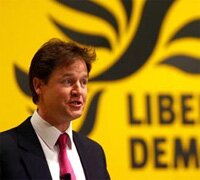Three excellent politicians
I thought for a change to the gloomy discussions that we often have here about politicians’ expenses, economic crisis, smear e-mails and so on, people here might be interested to hear about some good news about the future.
So I thought I’d write about three of the politicians who I admire, and who I think represent much of what is good about the liberal-left. Normally, these kinds of articles are about politicians of the past, often combined with complaints about how nowadays only ‘on message drones’ and ‘careerists’ from the political elite become MPs, often because of stitch ups and It’s Not Like In The Good Old Days.
But the three I’ve picked are rather different. They are all under 35 and they are all standing for parliament at the next election.
There’s been a lot in the news recently about Labour Party selections. Last week, the members in Houghton and Sunderland South had the choice between a trade union official, a former ‘Brownite’ minister, and Bridget Philipson, a 25 year old local woman who works for Wearside Women in Need managing a women’s refuge.
And they selected Bridget.
That’s a tribute to her formidable political skills. Bridget grew up in the area in Washington, and after graduating from Oxford University she moved back to the North East to work helping victims of domestic violence. She’s in the tradition of the very best Labour MPs over the years – people who are rooted in their local communities, who spent their time before standing for parliament working to help the vulnerable and marginalised, and fiercely bright and able.
The second person I wanted to mention is Nick Perry, who is the Liberal Democrat candidate in Hastings & Rye. I met Nick at a ‘Lib Dems against Poverty’ event which he organised. Their Work and Pensions spokesperson at the time, Danny Alexander, was there and gave a desperately unimpressive speech, and I remember thinking at the time what a contrast there was between the committed, knowledgable local activist and the hopeless shadow minister.
Nick grew up in St Helens, spent time after university volunteering for the anti-poverty organisation ATD 4th World, and he now works as a social worker. Don’t take my word about his abilities, you can read his blog here, and I particularly liked this post.
Nick is currently running an energetic campaign in a seat where the Lib Dems are in third place, and I hope and trust that his party will acknowledge his talents and that he will be selected somewhere winnable at a future election. Preferrably in a seat currently held by a Tory who he defeats soundly.
Thirdly, I really hope that Dr Anneliese Dodds is elected at the next election in the marginal constituency of Reading East. At the last election here, the Tories defeated Labour by a few hundred votes after a vicious and negative election campaign, electing someone who has already had to pay damages after admitting to libelling one of his political opponents. Since being elected, their MP has managed to find time to combine his day job with acting as a business consultant.
In contrast, Anneliese is one of the nicest and most hard-working people you could hope to meet. She’s been involved for many years in campaigns from international development and environmental campaigns with groups such as People & Planet to campaigning against the Iraq war; and a whole host of local campaigns on the issues raised by the people that she is campaigning to represent. As anyone who’s met her knows, nothing is ever too much trouble for her when it comes to helping other people.
She’s also an expert on many of the subjects which other politicians often talk about, but don’t know anything about. Speeches about the need to make public services more efficient, or to devolve power to local people are ten a penny, but people who know anything about how to actually achieve this are rare indeed. If you want the public sector to make best use of its resources, we need more MPs who are experts on technical but crucially important subjects like regulation and risk of public services, if you want to see a less centralised state and more power devolved to local communities, we need MPs who know about the examples of ‘bottom-up’, grassroots-led public services, how they differ from managerialist, top down services and how we can learn from their example. These are exactly the things which Anneliese spends her day job finding out and teaching other people about.
People like Bridget, Nick and Anneliese give me great hope for the future (incidentally, I didn’t contact any of them before writing this, it is entirely unsolicited fan tributes). I think their examples (and those of many others who I don’t have space to mention) demolishes the stereotype that the only people who are selected these days are careerists, or that any one party, whether Labour or the Lib Dems or anyone else, has a monopoly on talented and committed activists who represent the best that the liberal-left has to offer. And if you’re interested in politics but find that you are disillusioned by what seems to be on offer from the people currently representing us, I’m sure they’d all appreciate any help that you could offer…
---------------------------
| Tweet | Share on Tumblr |
Don Paskini is deputy-editor of LC. He also blogs at donpaskini. He is on twitter as @donpaskini
· Other posts by Don Paskini
Filed under
Blog ,Labour party ,Libdems ,Westminster
Sorry, the comment form is closed at this time.
Reader comments
Heaven forfend we should elect anyone with private sector experience.
Cjcjc:
On the other hand, heaven forfend that our elected representatives should be moonlighting as consultants to the very organisations their job is (in part) to regulate… that’s all rather American, wouldn’t you say?
Oh I don’t necessarily disagree with that…
“Heaven forfend we should elect anyone with private sector experience.”
Oh, yeah, I’d definitely elect someone who’s previous job was writing puff-pieces and making excuses for a mediocre TV company. That’s a REAL job in the REAL world, that is.
Don
These people may well be exceptional individuals but the biographical detail you give us seems to indicate that they have gone directly from higher education to socially worthy jobs and now want to enter parliament. From what you say, none of them have, even tangentially, been involved in employment the purpose of which is the creation of wealth.
Do you not feel that it would be better if those that aspire to govern us had more balanced experience on both sides of the equation?
Because to me it’s quite terrifying.
Is working in theprivate sector supposed to give you some secret skills you can’t get anywhere else?
Furthermore, I’d love to see actual evidence that MPs with private sector experience do or are better.
A few years ago I had a conversation with a guy who runs his own company making TV adverts – he makes a lot of money. I explained to him what public sector managers were supposed to do and he went white. He was quite sure he couldn’t do it. He could only meet one target at once – and in the private sector that’s all you have to do.
The main “skill” required in creating wealth is being in the right place at the right time. There may be a case for selecting candidates who have a track record of being lucky (Napoleon thought so), in which case Georgia “Pigtails” Gould is presumably going to be the most skilled member of the class of 2010.
Neither public nor private sector exercise effective cost control in boom times and it’s far from clear to me that “management” skills in hard times have progressed much beyond those shown by Dr Beeching.
cjcj and pagar
These are three people Don admires. No doubt there are also people who have achieved impressive things in the private sector, and who now want to go into politics in a spirit of public service or bringing about changes they believe in. So why not give us an example yourselves?
7 yes.
You learn the real value of money.
The architects of the most parlous economic disaster to hit our country (Brown/Darling) would possibly not have bankrupted the country had they had some appreciation of this.
Apart from a brief stint as a Lawyer have both not been sheltered from the rigours of the private sector?
“You learn the real value of money.”
Ahahha ha ha ha ha ha ha. Brilliant. Like Fred Goodwin did? Adam Applegarth? Bernie Madoff? Oh, my sides!
“Real value of money.” Absolute comedy genius!
Sigh
Criminals obviously understand the value of money as they are prepared to use dishonest means to acquire it. Again not completely unlike Brown/Darling – a real comedy duo.
So Brown and Darling do know the value of money… Make your mind up, Foxey Boy.
Speaking of lawers, I wasn’t aware that Goodwin or Applegarth had committed any crime…
Well Neil, no matter how much you (or I) dislike the boy king, he’s headed our way!
Sunder – of course we need a balance. I wasn’t meaning really to disparage these people;obviously I don’t know them
Though wouldn’t a lot of the ministers we now hate have had similar CV’s and appeared similarly “idealistic” at this same stage of life?!
I am a supporter of electing private-sector wealth creators, etc. to Parliament. But I think that alongside them there should be people with experience of the third sector, & also shop-floor employees, who used to have a presence in Labour until around the 1980s but were displaced.
Your rank & file types have been completely done away with in favour of wonks & lawyers. Yet, those who have scraped a living on £10-20000 a year, been laid off, & really felt the pain of such fucking shite as this, are exactly the sort of people we need to represent working-class folk in these times.
It is a constant theme in the welfare “reforms” that none of those involved have ever been on benefits or in a low-paid job.
Let us have genuine diversity, rather than ethnic & gender quotas for those who all have the same backgrounds & opinions, & are therefore not diverse in any meaningful respect.
I suppose I am rather resorting to the court of public opinion, but if good enough for Harriet…..
Brown/Darling could be described as dishonest as well as lacking an appreciation for the real value of money the too aren’t mutually exclusive.
It is inevitable that when you spend as much money as you want on whatever you want and then get to send the bills to someone else who has no choice but to pay, you lose all sense of the real value of what you are doing.
The same can equally be said for the rich.
“A few years ago I had a conversation with a guy who runs his own company making TV adverts – he makes a lot of money. I explained to him what public sector managers were supposed to do and he went white. He was quite sure he couldn’t do it. He could only meet one target at once – and in the private sector that’s all you have to do.”
Shouldn’t that indicate what’s wrong with public sector managerialism more than anything else? They should have one target, to satisfy the individuals who use their service. In private sectors dealing with direct and willing consumers (like supermarkets, restaurants, shops and hairdressers), a relatively simple feedback mechanism exists in the form of returning paying customers.
In the public sector, it might not be quite as simple but I am sure systems could be designed to make feedback a little bit more direct than a constituent lobbying a back bench MP, who sends a letter to a department, that discuss it with a minister, who asks a quango to look into it, that produce a new strategy to deal with a whole service that then gets posted down to the employees on the ground as another raft of targets.
Nice to see a positive post, and I certainly agree that Bridget and Annaliese will make excellent MPs if elected. (I don’t know about the other guy having never met him, but will take your word for it.)
I also agree with asquith (although I don’t think having more working class MPs with a history of being on low incomes and AWS are mutually exclusive). However that’s not a criticism levelled at any of the three identified in the main post, just that in addition to them I’d also like to see more people who’ve struggled on low incomes for long periods of their working life becoming MPs.
[17]
Shouldn’t that indicate what’s wrong with public sector managerialism more than anything else? They should have one target, to satisfy the individuals who use their service.
No, it’s not as simple as that. For example, a service might have very satisfied customers but for some reason has a poor “reach” into its potential customer base. (A private sector equivalent might be a family firm which has a good product and reputation but has no desire to expand its geographical reach.) Another issue – which you rightly highlight – is who do public sector workers work for? The current culture encourages them to work for their line manager, rather than their customers or any wider “public service ethos”. How do you turn that round? And at the top level senior managers seek to satisfy the politicians currently in office (without being so partisan that the other lot will want to get rid of them).
I’m sure feedback systems could be improved, but I’m not sure that they are always going to be helpful. For example, the government has made a big push to extend doctos’ surgeries opening hours in response to the wishes of people in work (or more precisely, their employers – so that people don’t have to take time off to visit their GP) but most of GPs work is actually seeing patients who aren’t in the workforce. My own GP is seeing pensioners at 7.30 in the morning because there aren’t enough younger people who want to see him then!
So feedback might well reveal conflicting aspirations in different parts of the customer base. Again, in the marketplace you simply decide which customers you want and you let the rest go somewhere else. The public sector can’t do this.
In some parts of the public sector, the majority of the customers probably don’t vote so there is a clear disconnect between the customer base and the people who sign the paychecks.
To be fair to libertarians, one reason they want the tiniest possible (or even imaginable) State may well be that they consider these conundrums insoluble.
I knew both Brown and Darling when they were young men. Both were heavily involved in student politics in those days and both have pursued careers as politicians.
I don’t impugn their motivation in doing this. They wanted to try to make a difference- to make a better world and I’m sure this motivation is shared by Don’s fledgling politicians. However unless they have spent time living and working in the “real world” I believe there is likely to be a disconnect between their skills and experience and the job that needs to be done.
In some of her pronouncements, Harriet Harman, sounds as if she has never left the Student Union debating chamber.
From personal experience, an individual’s involvement in private sector employment is no measure of their probity whatsoever.
I remember Anneliese when she was OUSU President. She was great and I’m glad to hear she’s standing; if I lived in Reading East I might actually be tempted to vote Labour.
While on the subject of former OUSU Presidents turned Labour candidates, I see Kirsty McNeill is standing again in Bermondsey & Old Southwark against Simon Hughes. If I lived there I would NOT be voting Labour.
@Nick “Shouldn’t that indicate what’s wrong with public sector managerialism more than anything else? They should have one target, to satisfy the individuals who use their service.”
Really? That should be quite easy to achieve then, we can just give the service users whatever they want. Of course that’s going to upset the taxpayer, because it will be expensive. I’m sure there are cheaper ways of making ‘service users’ happy, though. All those people we have to help raise their kids because they are completely feckless are quite unhappy when we break it to them. We could probably just tell them they’re doing a great job and leave them alone. Mission accomplished? Don’t want your meals on wheels delivered by the black lady any more Mrs Crotchet? No problem, whatever makes you satistfied! What about the tie-dye brigade who turn up at their GP demanding homeopathy and crystal protection against electro-magnetic poisons – hand it over to make sure they tick the ‘satistfied’ box? We’d better not set any homework in schools either, it makes the kids ‘dissatistfied’. Exams are even worse. The Government seems to want them for some sort of ‘measuring’ lark, but the Government isn’t a service user, so we can ignore them and do what the kids want. What’s that, you want us to help you build a block of flats, but you over there want us to protect your view? Sure, the public sector can deliver fire and ice together, no worries! Hey someone’s got a really great idea for improving our services. It sounds ridiculous but it totally works, we’ve trialled it and the service users really appreciate it. Apparently the local newspaper editor says if we do it he’s going to call for the resignation of every Councillor and staff member involved, but he’s not a service user, so we don’t have to consider his reaction, do we?
See the problem? All else being equal, we want the people we are serving to like our services, but if that’s the only measure, other important outcomes would rapidly spiral out of control.
http://www.economist.com/world/intenational/displayStory.cfm?story_id=13496638
I would love to see less lawyers in our parliament. Nothing against them per say but too many of any profession must be bad.
#23 thelocalgovernmentofficer – excellent comment.
Dr Anneliese Dodds may well be a very nice person but she is truly awful when it comes to politics.
She is never seen in the constituency except when praising the government, trying to hijack a campaign or getting one of her handful of loyalist activists to make an artificial complaint for pure publicity purposes.
She has made herself look a fool on every occasion she has spoken publicly here by being unaware of the policies her party has voted for (and I’m not just talking about Iraq here – I’m talking about controversial planning applications, opposing mediated conclusions between community groups and authorities, council housing rent rises, funding for environmental health etc).
At a recent public consultation on private rented housing she even lost her temper when she was cut off trying to turn a contribution from the floor into a grandstand for a hastily thrown together plan, despite bringing support from a couple of party members (who, as landlords, were suspected of committing electoral fraud and were widely recognized as operating sharp practices against several assembled tenant present).
About the only policy she clearly supports is the complete prohibition of alcohol, but that even can’t make her popular with the bevvy of sozzled Labour councillors who still clutch to their seats here.
It has also been pointed out to her that as she trades on her background in academia she should at least be able to do some basic research about the group she is involved with.
She is not respected by many local Labour members let alone the public, so it will be a huge surprise if she doesn’t come third.
That she could possibly make anyone hopeful for the future of Labour only highlights what a parlous state the party is in.
While we’re at it let’s clear up some of the biased reporting of the last election for Reading East.
The viciousness of local campaigns has been a constant where the Reading & District Labour party is concerned.
Initially Labour shot itself in the foot by deselecting the sitting MP (a historical first), who happened to be popular, reasonable and hard-working. Even now she retains a strong connection with the town and is on good terms with many former constituents.
Labour in-fighting then continued throughout the campaign as Reading West’s Labour baron, Martin Salter, repeatedly removed any deliverers, canvassers and doorknockers to his side of town to bolster his own larger majority – this was the single most decisive action according to all sides.
Salter also tried to scupper his own party’s chances in Reading East through a variety of means, such as manipulating council resources in ways which would undermine his rivals (the council has since changed to NOC, so it won’t be possible this time). Let’s just remember that it is on the back of this electoral performance that Salter is now under Douglas Alexander working on Labour’s national strategy. Salter’s record supporting Keith Vaz on the Home Affairs select committee isn’t relevant in this context, though his janus-faced posturing over the Gurkha issue is.
An additional problem for the Reading East Labour party also came to a crunch when it’s favoritism of local ethnic and religious groups became seen directly politically motivated and several influential elders were aggrieved that there was no quid pro quo forthcoming. They defected.
Finally the Rdg E Labour candidate had two spent convictions for sexual offenses. The nature of his crimes did not go down well with all the public and his homosexuality upset a significant portion of the religious Labour activist base in the area, meanwhile his record as an lead councillor was also used against him.
All in all you might say there was a conspiracy of events which was designed at masochism.
Add to this a credible alternative candidate who ticked many of the necessary boxes (he was even in the SDP) and the odds were against Labour keeping it’s 5,000 majority.
Since then Rob Wilson has been a solid, if not spectacular replacement. There are the usual question marks over him as with all tories, but that he has risen further through the ranks in one term than Salter managed in over a decade should tell you all you need to know.
My town provides ample demonstration of what Labour stands for – corruption, bullying, failed service scandals, debt and the rest – it is example enough never to want to touch them again in a million years. And I say this as someone who helped them between 97 and 99.
Reactions: Twitter, blogs
-
Liberal Conspiracy
New post: Three excellent politicians http://tinyurl.com/cdkpq3
[Original tweet] -
Three Excellent Politicians - Common Endeavour
[...] of Don Paskini at [...]
Sorry, the comment form is closed at this time.
You can read articles through the front page, via Twitter or RSS feed. You can also get them by email and through our Facebook group.
» What’s the point of being ‘British’?
» The tragedy behind the Sam Hallam case
» Will JP Morgan be able to walk away from billion dollar losses?
» Labour is now even more reliant on left-wing voters
» We need the minimum wage for under-21s to be raised
» Has Liam Byrne discovered his conscience over disability benefits?
» Why the jobs crisis is far worse than headline figures
» Students: help us demand accountability from University Vice-Chancellors
» What do we want from the BBC?
» The coming crisis of Conservatism
» Others should follow the Cooperative in boycotting Israeli settlement goods
|
20 Comments 16 Comments 15 Comments 51 Comments 13 Comments 26 Comments 58 Comments 65 Comments 93 Comments 68 Comments |
LATEST COMMENTS » pjt posted on How Facebook made only the rich even richer » MarkAustin posted on Illustration: IDS's £25bn welfare cuts » x posted on How Facebook made only the rich even richer » CanSpeccy posted on Did UKIP ignore concerns about BNP? » E A posted on The resurgence of bigoted conservatism in Ireland » So Much For Subtlety posted on The resurgence of bigoted conservatism in Ireland » So Much For Subtlety posted on How Facebook made only the rich even richer » E A posted on The resurgence of bigoted conservatism in Ireland » Trooper Thompson posted on What do we want from the BBC? » Phil Hunt posted on How Facebook made only the rich even richer » Shatterface posted on The resurgence of bigoted conservatism in Ireland » David Lindsay posted on Did UKIP ignore concerns about BNP? » Dissident posted on How Facebook made only the rich even richer » Andrew Palmer posted on The resurgence of bigoted conservatism in Ireland » P Ve M posted on Public DOES want gay marriage, Lords reform |









